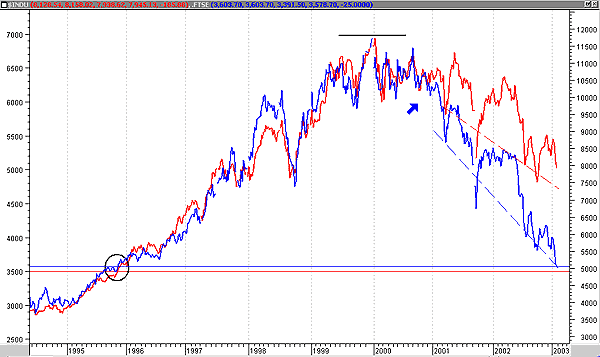
HOT TOPICS LIST
- MACD
- Fibonacci
- RSI
- Gann
- ADXR
- Stochastics
- Volume
- Triangles
- Futures
- Cycles
- Volatility
- ZIGZAG
- MESA
- Retracement
- Aroon
INDICATORS LIST
LIST OF TOPICS
PRINT THIS ARTICLE
by Matt Blackman
The study of intermarket analysis tells us that global indexes tend to follow one another. At times they diverge but eventually they align. With that in mind, there are a few things that the FTSE may be trying to tell us about the Dow.
Position: N/A
Matt Blackman
Matt Blackman is a full-time technical and financial writer and trader. He produces corporate and financial newsletters, and assists clients in getting published in the mainstream media. He is the host of TradeSystemGuru.com. Matt has earned the Chartered Market Technician (CMT) designation. Find out what stocks and futures Matt is watching on Twitter at www.twitter.com/RatioTrade
PRINT THIS ARTICLE
TECHNICAL ANALYSIS
Is the FTSE Trying to Tell Us Something?
02/04/03 12:54:02 PMby Matt Blackman
The study of intermarket analysis tells us that global indexes tend to follow one another. At times they diverge but eventually they align. With that in mind, there are a few things that the FTSE may be trying to tell us about the Dow.
Position: N/A
| Historically the London Financial Times Market ($FTSE) has had a very close link to the Dow Jones Industrial Average ($INDU) and vice-versa. According to John Murphy, very often international markets lead the US. He believes that the FTSE and Japanese Nikkei are the most useful in determining market direction at home. |
| When international markets diverge, it is therefore a warning that the other markets will follow suit sooner or later. With that thought in mind, the FTSE may be trying to tell us something. On January 29, it hit a seven-year low of 3,391 and while it has recovered slightly since, the longer-term prognosis is not promising from a technical perspective (although it may experience a short-term bounce in early February). The index has dropped more than 48% from its December 1999 highs. In the case of the Dow, as of January 30, it had dropped only 32% from its January 2000 highs. As you can see from Figure 1, the two markets began to diverge in late 2000. This divergence increased in mid-2002. |

|
| Figure 1 – Weekly chart of the FTSE ($FTSE) in blue and DJIA ($INDU) in red showing market tops and divergence between them (blue arrow). Assuming convergence, the DOW should be trading at a seven-year low (red horizontal line) of 4,870, which was its November 10, 1995 level (see black circle). |
| Graphic provided by: MetaStock. |
| |
| Intermarket analysis does not seek to explain the reason for market divergences but this does pose an interesting question. There are those who believe that the DOW has been kept artificially high. Comparing it to the FTSE and Nasdaq indexes, this argument would appear to have some merit although there is a complex array of factors involved. If the Dow follows the FTSE, it should continue trading down to its seven-year low. The other possibility is that the FTSE will follow the Dow's lead and recover significantly. Given the current fundamental challenges facing the US and global economies, however, this scenario must be considered less likely. |
| SUGGESTED READING: Blackman, Matt [2002] "10 Fundamental Challenges Facing a Market Rebound," Working Money: December 17 |
Matt Blackman is a full-time technical and financial writer and trader. He produces corporate and financial newsletters, and assists clients in getting published in the mainstream media. He is the host of TradeSystemGuru.com. Matt has earned the Chartered Market Technician (CMT) designation. Find out what stocks and futures Matt is watching on Twitter at www.twitter.com/RatioTrade
| Company: | TradeSystemGuru.com |
| Address: | Box 2589 |
| Garibaldi Highlands, BC Canada | |
| Phone # for sales: | 604-898-9069 |
| Fax: | 604-898-9069 |
| Website: | www.tradesystemguru.com |
| E-mail address: | indextradermb@gmail.com |
Traders' Resource Links | |
| TradeSystemGuru.com has not added any product or service information to TRADERS' RESOURCE. | |
Click here for more information about our publications!
Comments
Date: 02/04/03Rank: 5Comment:
Date: 02/06/03Rank: 5Comment:
Date: 02/10/03Rank: 5Comment:

|

Request Information From Our Sponsors
- StockCharts.com, Inc.
- Candle Patterns
- Candlestick Charting Explained
- Intermarket Technical Analysis
- John Murphy on Chart Analysis
- John Murphy's Chart Pattern Recognition
- John Murphy's Market Message
- MurphyExplainsMarketAnalysis-Intermarket Analysis
- MurphyExplainsMarketAnalysis-Visual Analysis
- StockCharts.com
- Technical Analysis of the Financial Markets
- The Visual Investor
- VectorVest, Inc.
- Executive Premier Workshop
- One-Day Options Course
- OptionsPro
- Retirement Income Workshop
- Sure-Fire Trading Systems (VectorVest, Inc.)
- Trading as a Business Workshop
- VectorVest 7 EOD
- VectorVest 7 RealTime/IntraDay
- VectorVest AutoTester
- VectorVest Educational Services
- VectorVest OnLine
- VectorVest Options Analyzer
- VectorVest ProGraphics v6.0
- VectorVest ProTrader 7
- VectorVest RealTime Derby Tool
- VectorVest Simulator
- VectorVest Variator
- VectorVest Watchdog
